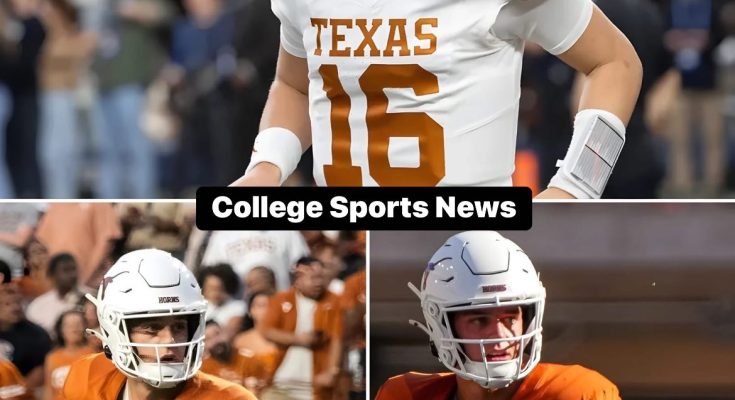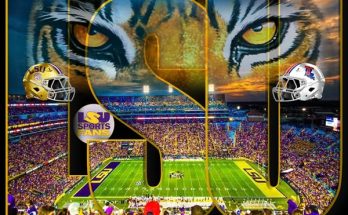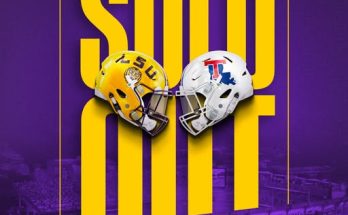Arch Manning entered the 2025 college football season with expectations higher than perhaps any other player in the country. As the grandson of Archie Manning and the nephew of Peyton and Eli, he has carried a last name that has become synonymous with quarterback greatness. His choice to play at Texas was billed as a program-defining moment, one that could restore the Longhorns to the elite status their fans have long been craving. Add to that the buzz of being the preseason Heisman Trophy favorite, and the stage for his first full season as the starter was set with an atmosphere of electricity and scrutiny. But football often has a way of humbling even the most promising stars, and Arch Manning found that out in his opening-weekend showdown against the Ohio State Buckeyes, a game that turned into a sobering reality check both for him and for Texas.
The final score of 14-7 told a story of a defensive battle, but the deeper narrative revolved around Manning’s uneven play against a fierce Ohio State defense engineered by coordinator Matt Patricia. Manning completed just 17 of 30 passes for 170 yards, with a single touchdown and one interception. On paper, those numbers may not look catastrophic, but when measured against the expectations surrounding him, they revealed a quarterback still learning to match his immense talent with consistency under pressure. His off-target throw rate reached 37 percent, a statistic that is startling given that it marks the worst performance by a Texas quarterback in a decade. For someone who entered the season with an NIL valuation of \$6.8 million and Heisman hype swirling, that kind of inefficiency opened the door for heavy criticism from analysts, fans, and detractors alike.
What amplified the fallout was not just the performance on the field but its immediate impact off of it. According to On3, Arch Manning’s NIL valuation plummeted by \$485,000 following the game, dropping him from a staggering \$6.8 million to around \$6.3 million. That figure might still rank him among the most marketable athletes in college football, but the sharp decline underscores how fragile these valuations can be when tied to performance and perception. For all the talk about NIL empowering athletes, it also has created an environment where every game has financial consequences. Manning’s dip in valuation highlights the volatility of being a high-profile college athlete in today’s media-driven, results-oriented landscape.
Yet it wasn’t all bad. Manning did show glimpses of why so many believe he can be the next great quarterback in his family. Late in the game, with Texas still clinging to hope of an upset, he delivered a beautiful 32-yard touchdown strike that reminded everyone of his arm talent and ability to shine under the brightest lights. But those flashes weren’t enough to overcome missed opportunities earlier, especially in the red zone where Texas failed to capitalize. The inability to finish drives doomed the Longhorns against an Ohio State team that prides itself on making adjustments and suffocating quarterbacks with pressure and disguised coverages. Manning’s interception, thrown on an ill-advised attempt into double coverage, further reinforced the notion that while his ceiling is sky-high, his decision-making still has room to grow.
Texas coach Steve Sarkisian, for his part, struck an optimistic tone after the game. He downplayed the significance of the loss in the grand scheme of the season, calling it “just one chapter” in Manning’s journey. Sarkisian emphasized that this was not the end but rather the beginning of a process where Manning will learn, adapt, and improve. And there is truth in that. College football is filled with examples of quarterbacks who stumbled early only to find their footing later. Peyton Manning himself threw multiple interceptions in his early college career before developing into a legend. The challenge for Arch will be balancing the pressure of carrying a storied last name with the patience required to let his own career unfold.
Fans and analysts, however, often lack that patience. The discourse following the game has been fierce. Some argue that the performance showed Manning isn’t ready to be an elite NFL prospect just yet, suggesting that scouts will be watching closely to see if he can clean up his mechanics and accuracy in the coming weeks. Others caution against overreaction, pointing out that he faced one of the best defenses in the country in his very first start of the season, and that one game should not dictate the narrative for an entire career. Both perspectives hold weight, but what cannot be denied is that the pressure on Arch Manning will only intensify from here. Every throw he makes will be dissected, every win or loss tied to his ability to lead Texas back to prominence.
From a broader lens, the opening weekend underscored the razor-thin margins between success and failure in college football. One or two missed throws in the red zone, one mistimed interception, or one stalled drive can flip the perception of a quarterback from savior to liability in an instant. Manning now has to navigate the tricky psychological terrain of bouncing back, knowing that each game moving forward will either restore confidence in his ability or add to the growing skepticism. Texas’ upcoming schedule does offer easier matchups, which should provide him the opportunity to rebound and rebuild both his statistics and his Heisman campaign. If he can post dominant performances against less intimidating defenses, the conversation may quickly swing back in his favor.
For Texas as a program, the loss stings but does not eliminate their hopes for a strong season. Ohio State is a perennial powerhouse ranked No. 3 in the nation, and losing to them by a single score is far from disastrous. The Longhorns’ defense kept them in the game, and with a few offensive adjustments, Texas could very well emerge as a contender in the Big 12 and beyond. The key will be Manning’s ability to grow into the role of leader and playmaker while cutting down on mistakes. Sarkisian’s scheme is designed to put quarterbacks in a position to succeed, but execution ultimately falls on the player.
The story of Arch Manning’s debut also speaks to the evolving nature of college sports in the NIL era. In the past, a bad game might have simply resulted in criticism from fans and media. Now, it has tangible financial consequences. Endorsements, social media reach, and overall marketability are tied to performance and narrative more than ever before. A \$485,000 hit in valuation sends a clear signal that brands and investors are closely monitoring not just long-term potential but short-term results. Manning, despite his last name, is not immune to that reality. For some athletes, such financial pressures could be overwhelming, but for others, it serves as fuel to sharpen their focus and bounce back stronger.
Ultimately, Arch Manning’s career will not be defined by one game. History is full of examples of great quarterbacks who endured difficult starts. What matters most is how he responds. Does he let the criticism and valuation drop affect his confidence, or does he use it as motivation to refine his mechanics, improve his decision-making, and prove that he belongs at the top of college football? That question will be answered in the weeks ahead, and it will shape not only his Heisman chances but also his NFL draft stock. Scouts will be watching not just for physical skills but for intangibles—leadership, resilience, and the ability to bounce back from adversity.
In many ways, Arch Manning’s journey mirrors the modern college football experience: talent meets expectation, expectation meets scrutiny, and scrutiny meets opportunity. The road ahead will test his mental toughness as much as his physical skills. For fans of the Longhorns, the hope is that this game against Ohio State becomes a stepping stone rather than a stumbling block. The next few weeks will reveal whether Arch Manning is ready to shoulder the immense weight of his family name, his NIL status, and the lofty goals Texas fans have placed upon him.
What do you think about Arch Manning’s performance and the fallout from the Ohio State game? Was it just a case of running into a top-tier defense, or does it expose deeper issues that could affect his Heisman and NFL future? Do you think the NIL valuation drop is fair, or does it place too much pressure on young athletes? Share your thoughts and join the conversation below, because the story of Arch Manning’s season is just getting started, and your perspective adds to the broader dialogue about college football, pressure, and the making of stars.



